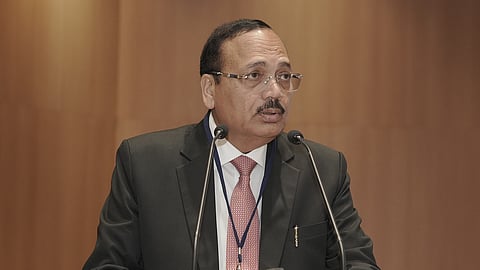
- Latest Legal News
- News
- Dealstreet
- Viewpoint
- Columns
- Interviews
- Law School
- Legal Jobs
- हिंदी
- ಕನ್ನಡ

Article 21 of the Constitution, which guarantees the right to life and personal liberty, must also be interpreted as extending to the preservation of ecological conditions essential for sustaining life, Supreme Court Justice Surya Kant said on Saturday.
He underscored that justice cannot be allowed to function selectively, neither in what it stands for nor in how it is applied.
"Justice cannot be permitted to operate selectively—neither in its substance nor in its application. Article 21, which enshrines the right to life and personal security, must be understood as extending also to the preservation of ecological conditions essential for the sustenance of that life," he said.
Justice Kant was speaking at a conference aimed at addressing the growing challenges of human-wildlife conflict in Kerala.
The conference organized by the National Legal Services Authority (NALSA) and the Kerala State Legal Services Authority (KeLSA) was held in Thiruvananthapuram and was attended by Supreme Court and High Court judges.
In his speech, Justice Kant emphasized that ecological justice means balancing human rights with the need for conservation of ecology.
"In securing the conditions necessary for wildlife to thrive, we need to simultaneously ensure the safety, stability and well being of human communities," he said.
He underscored that human–wildlife conflict is not only an environmental issue but also a matter of justice and governance. He added that legal aid must reach vulnerable communities living on the edges of forests.
"As we move forward, our gaze must remain fixed upon those who continue to suffer as victims of human-wildlife conflict. Since many victims belong to marginalized communities, they are their families are often unaware of the legal rights and entitlements available to them," he noted.
He further added that the judiciary, most notably through the Green Bench of the Supreme Court, has played a pivotal role in ensuring that the nation’s developmental pursuits do not extract an irreparable price from its flora and fauna.
The event also marked the formal launch of three initiatives by NALSA. The first, the NALSA Scheme on Access to Justice for Victims of Human–Wildlife Conflict (HWC), 2025, seeks to ensure free legal aid, awareness and timely assistance to families affected by such conflicts, while at the same time promoting ecological balance and coexistence.
This scheme was followed by the launch of a first-of-its-kind Compendium on Human–Wildlife Conflict, compiling national and state-level policies, guidelines and judicial pronouncements.
NALSA also introduced NALSA SPRUHA (Supporting Potential and Resilience of the Unseen, Held-back and Affected) Scheme, 2025, aimed at supporting dependents of incarcerated persons and victims of crime through legal aid, counselling and reintegration.
[Read Live Coverage of Event Below]